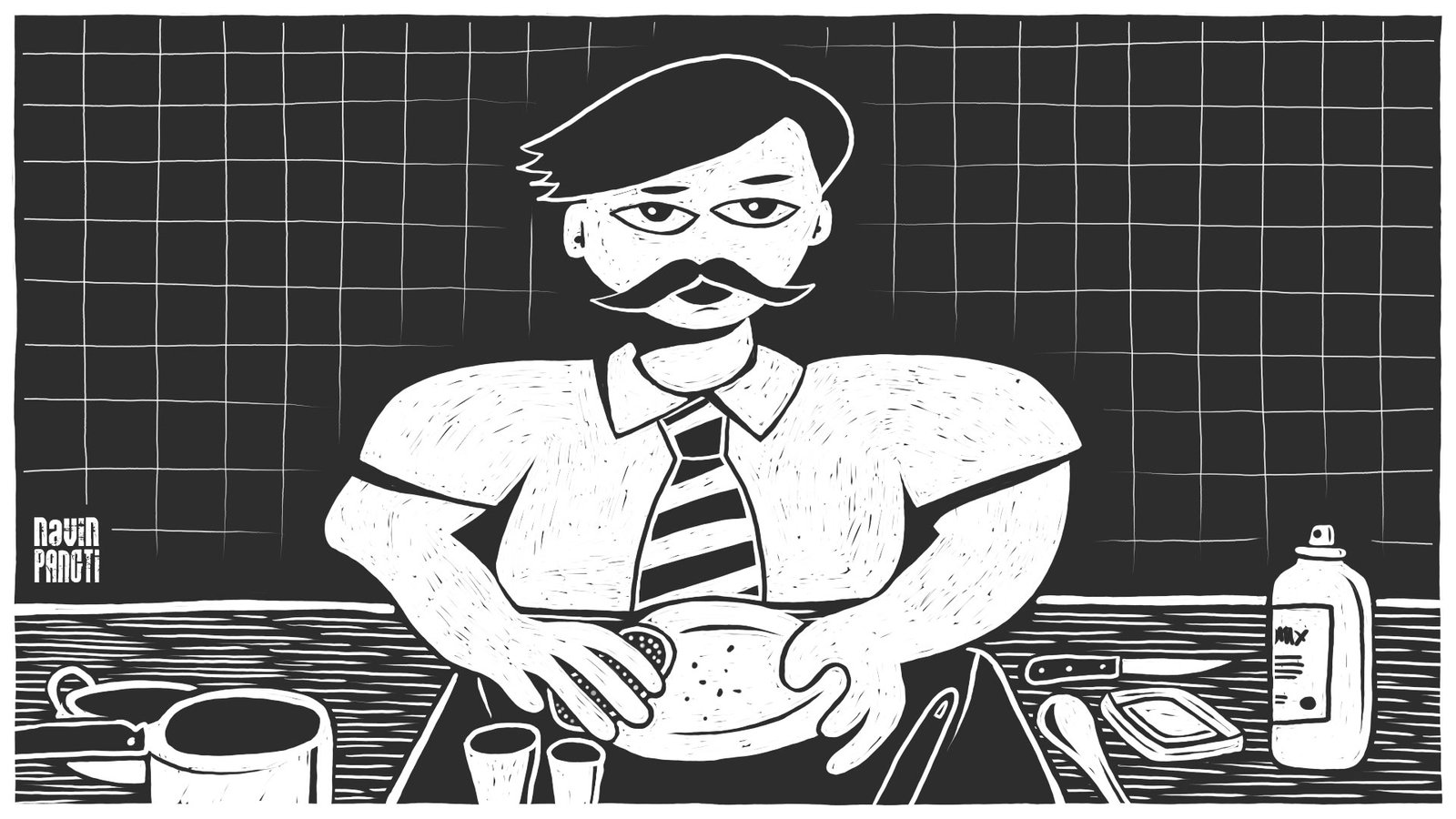Five reasons why men should wash dishes
The act of washing dishes not only helps men challenge the gendered roles, but also understand the politics of gender, class hierarchies, internalized patriarchy and classification of work. Plus they get an opportunity to meet themselves.
I like washing dishes, seeing it as my contribution to domestic chores. I also like cutting vegetables, which compensates for my ineptitude in and dislike for cooking.
While my wife is ok with me cutting and chopping, she dislikes my washing the dishes, claiming I am no good at it. I think it’s a bias she has inherited from my mother-in-law who too does not like men washing the dishes.
To ensure that it is not a family disorder, I cross-checked elsewhere. I asked around and found that it is a pretty common notion that men should do anything but wash dishes and sweep/mop the floor. In some cases, even asking this question was blasphemous.
To me this attitude represents a deep-seated bias regarding men’s involvement in household work as well as the classification of work itself. I strongly feel that men should wash the dishes. From what I have experienced, most men are not good at cooking – either by design or desire. Moreover, cooking is an art form which has to be nurtured. But washing dishes is a skill that can be picked fast.
Here are five key reasons why I think men should wash the dishes (as often as they can if not regularly). It will not only help them personally but also help society at large.
Reason 1
Help fight patriarchy and gendered roles
Owing to the gendered roles fixed by patriarchal societies over the centuries, there are things that men do and things that they do not do. The latter are tasks meant for women – tasks often seen as lowly, hence they do not get acknowledged. Society labels them as ‘the duties of a woman’, whatever that means. Even the modern laws define housewives as non-productive social workers.

When we men wash the dishes, we not only challenge these gendered roles in our own heads but also in the minds of women in our households. It is also essential because women too need to understand the politics of gendered roles. Having internalized patriarchy, women tend to keep their husbands away from domestic chores on the pretext that they are not good at them. Well, men are not good at doing many other things but they are not stopped from learning them. In fact, they are pushed to challenge the boundaries. So why not encourage them to do the dishes well?
The media often defines the success of women as excelling at doing what the ‘men’ do. Ever wondered where that comes from? A quote by Colonel Gaddafi (I think it was him. Searched online but could find no reference) is stuck in my head for years now. He had said that gender equality is not about women trying to be like men or vice versa. It is about being able to do and excel at what one wants to do.
Reason 2
Wash dishes to fight class hierarchies
Caste and class hierarchies are closely related. Both are equally responsible for the classification of work in a way that the ‘higher/upper’ class performs ‘higher/superior’ functions and the ‘lower’ class performs ‘lower/menial’ tasks. Since work perceived as menial fetches lesser remuneration and reward, the class gap keeps growing.
Think about it – the person who copy pastes codes in your office or makes ledger entries, earns far more respect and money than a farmer, mason or plumber. Even in developed societies, where remuneration is no longer ‘low’, the status of such work is yet to ascend the ladder of work hierarchies.
Washing dishes, like sweeping or mopping, is perceived as lowly work, to be shunned. In many an urban households, children dump their plates into the kitchen sink without even clearing the leftovers. That ‘ugh’ task of picking up the leftover pizza piece from the plate is to be performed by the domestic help.
But when you pick up the leftovers on the plate with your bare hands and toss it into the bin, you will stop feeling disgusted in a restaurant when you find tidbits of an earlier meal lying on the table that you want to occupy. Wanting a clean table is one thing, but looking at a morsel with disgust is something completely different. It reflects class bias.
When you wash dishes, you automatically confront these realities. You confront waste. You understand privilege. Washing the dishes used by someone other than your close family member makes you humble. When you wash the cup in which your driver had tea makes you a better person. Just do it. You will figure it out yourself!
Reason 3
Help redefine drudgery
There are many tasks which are perceived as drudgery. Drudgery has an association with caste and class. Even within a caste or class, work gets further sub-classified. Even drudgery acquires hierarchy. Lower the task, more the drudgery.
I am reminded of something Vinobha Bhave wrote in ‘Shikshan Vichar’, about how, as humanity evolved, work got classified into ‘Rahu’ and ‘Ketu’. The story goes that a long time ago, gods and demons got together to churn the ocean (samudra manthan) for extracting Amrit, the immortality potion. To cut a long story short, the demons stole the Amrit and Lord Vishnu had to take the form of Mohini, an enchantress, to retrieve Amrit. As Amrit was being served to the gods, a demon changed his appearance and consumed the potion. Lord Vishnu chopped his head but by then the demon had already become immortal. His head lived thereafter as Rahu and the headless body came to be known as Ketu.

Vinobha Bhave says in our society there are two types of people. Some apply their minds but not their body (Rahu) while the others use their body but not their minds (Ketu). Technically, Rahu is the privilege while Ketu signifies drudgery.
Technically, there is nothing called dull work. Work is work. Assigning work to someone else because it is drudgery is a privilege. Even I am guilty of that privilege. This is quite different from one’s inability to do a work due to age or lack of skill. Washing dishes is a fairly easy task that most men can do. It brings harmony between our Rahu and Ketu and is a good way to keep our mind and body in sync.
Reason 4
Be a good role model
There is a huge difference between talking about change and being the change. Ideological armchair discussions are pretty commonplace. Social media allows us to trumpet our opinions but there is no way for anyone else to find out if we really live by our words. But our children are watching us continuously. Chances are that they will accept these contradictions and imbibe them as reality of life. Or they will contradict and confront us. Because children love their parents and are unable to differentiate between love and respect, it is likely that they may choose the former.
When we wash the dishes, we make the world simpler for people around us, especially children. Our daily chores that redefine gendered roles, class hierarchies, drudgery, go a long way in instilling the idea of equality in the tender minds of our children.
Reason 5
Find your inner self
Many experts and reports claim that a large section of the society needs urgent mental health intervention. The causes are many. I think that one of the key reasons is the gap between our ‘learnt’ goals and ‘real’ goals. Learnt goals are largely material or social. Achieving those goals often provides momentary happiness and may end up making us more lonely and sad as, deep inside, we long for something else.
Frankly, have you ever deeply thought about what you really want, without confusing it with material or social goal? In all likelihood one would have asked the question to oneself and then pushed it towards some dark corner to avoid finding answers. Sadly, avoiding a question does not mean that it ceases to exist. It waits there while we drown ourselves in other realities. Exhausted with work, we indulge ourselves in consumption – eating out, shopping, audio-visual experiences, digital experiences, and so on. But none of these offer peace of mind because our mind somehow remains aware of that unanswered question.
I firmly believe that actions like washing dishes, ironing clothes, sweeping the floor, etc. fall in the category of ‘here and now’. It is that space and time when our body works in semi-automated mode, allowing our mind to be with itself, at peace – processing real questions and seeking viable answers. Frankly, one does not need a Vipassana retreat or group meditation to seek oneself. I do not doubt their efficacy but I think what one really needs is time and willingness to be with oneself on a regular basis. And that time and opportunity awaits at the kitchen sink!
Foot note – Please do not try to wash the dishes wearing fancy aprons and clothes. It does not work that way. A skilled person can do the dishes even in business suit. That is the real nirvana!















Can I add Sixth sense, oh sorry reason of washing dishes… Apne bartanoo Ko jananne ko Sukh…you kind of build a deep rapport with one of most underrated household member…they start smiling at you that way…
🙂
Brilliant piece of ideas. Absolutely nailed it!
Relevant. It is the only way I find acceptance in Kitchen.
Love the footnote…
Learned the art while studying and living with my friends. So experienced now that I can participate in a debate if Republic TV decides to host about “how to wash utensils and which washing bar/liquid is better then other “
Really loved the piece Navin, this echoed with some of my own thoughts. Especially the one where you mention that it sends a signal to the young minds at home about equality of labour at home, clearing ones own plates and rising above their and our own “ugh” moments.
I would also like to add, if I may, if frees up your better half faster to be able to enjoy her meal or a cup of tea with sitting down with everyone else or may be just reach her bed faster for her well deserved rest. Why not? She did not enter the realm of matrimony signing an invisible contract that said, I will do all your menial chores and in addition to a day job.
Helps in being careful the next time whenever a new glass/cup/cutlery is being picked up, while an existing one can be reused 🙂